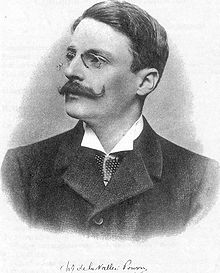- Charles Jean de la Vallée-Poussin
-
Charles-Jean Étienne Gustave Nicolas de la Vallée Poussin (14 August 1866 - 2 March 1962) was a Belgian mathematician. He is most well known for proving the Prime number theorem.
The king of Belgium ennobled him with the title of baron.
Contents
Biography
He was born in Leuven, Belgium and spent most of his life there. He was taught mathematics at the Catholic University of Leuven by Louis-Philippe Gilbert (who was his uncle), after he obtained his diploma in engineering he was encouraged to obtain a doctorate in the sciences of physics and mathematics, and from 1891 when he was 25 he was assistant professor in Mathematical Analysis. He became a teacher at the same university (just like his father, Charles-Louis-Joseph-Xavier de la Vallée-Poussin, who taught mineralogy and geology) in 1892, obtaining Gilbert's chair at his death. While teaching he carried out research in mathematical analysis and the theory of numbers and in 1905 was awarded the Decennial Prize for Pure Mathematics 1894-1903. He was to be awarded this prize a second time in 1924 for his work in the period 1914 to 1923. In 1898 he was nominated correspondent to the Royal Academy (at the age of 32) and a Member of the Academy in 1908. In 1923 he was President of the Division of Sciences. In 1914 he escaped from Leuven on its destruction by the invading Germans and was invited to teach at Harvard in the United States, this was followed by professorships in Paris at the Collège de France and at the Sorbonne in 1918. After the war he returned to Belgium, The International Union of Mathematicians was created and he was invited to become its President; he was to remain Honorary President. Between 1918 and 1925 he traveled extensively, teaching in Geneva, Strasbourg and Madrid and then in the United States where he gave lectures at the Universities of Chicago, Berkeley, Brown, Yale, Princeton, Columbia, Philadelphia and the Rice Institute. He was Doctor Honoris Causa of the Universities of Paris, Toronto, Strasbourg and Oslo, Associate of the Institute of France and Member of the Pontifical Academy of Nuovi Lincei, Nazionale dei Lincei, Madrid, Naples, Boston. He was awarded the title of Baron by King Albert 1 of the Belgians in 1928.
In 1961, he fractured his shoulder and this incident led him to death in Boitsfort (Watermaal-Bosvoorde), Brussels a few months later.
A student of his, Georges Lemaître, would later be the first to propose a Big Bang theory of the history of the Universe.
Work
Although his first mathematical interests were in analysis, he became suddenly famous as he proved the prime number theorem independently of his coeval Jacques Hadamard in 1896.
Afterwards, he found interest in approximation theory. He defined, for any continuous function f on the standard interval [−1,1], the sums
 ,
,
where
and
are the vectors of the dual basis with respect to the basis of Chebyshev polynomials (defined as
 .
.
Note that the formula is also valid with Sn being the Fourier sum of a 2π-periodic function 'F' such that
 .
.
Finally, the de la Vallée-Poussin sums can be evaluated in terms of the so-called Fejér sums (say Fn)
 .
.
The kernel is bounded (
 ) and obeys the property
) and obeys the property , if
, if 
Later, he worked on potential theory and complex analysis.
Notes
see also
External links
- Biographie Universelle, by Didot.
- O'Connor, John J.; Robertson, Edmund F., "Charles Jean de la Vallée-Poussin", MacTutor History of Mathematics archive, University of St Andrews, http://www-history.mcs.st-andrews.ac.uk/Biographies/Vallee_Poussin.html.
- Obituary
Categories:- 1866 births
- 1962 deaths
- People from Leuven
- 19th-century mathematicians
- 20th-century mathematicians
- Number theorists
- Harvard University faculty
- University of Paris faculty
- Belgian scientists
- Belgian mathematicians
- Alumni of the Catholic University of Leuven before 1968
- Barons of Belgium
Wikimedia Foundation. 2010.



